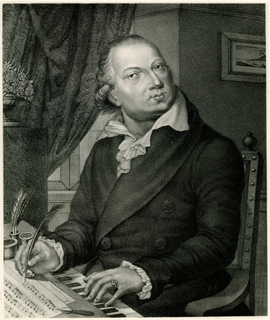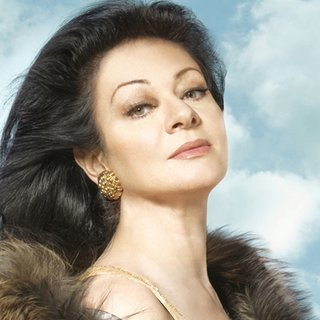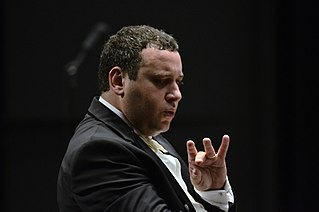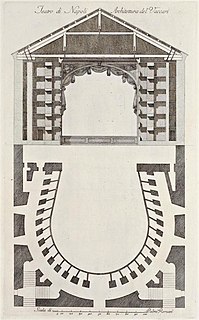
Domenico Cimarosa was an Italian composer of the Neapolitan school and of the Classical period. He wrote more than eighty operas, the best known of which is Il matrimonio segreto (1792); most of his operas are comedies. He also wrote instrumental works and church music.
An impresario is a person who organizes and often finances concerts, plays, or operas, performing a role in stage arts that is similar to that of a film or television producer.

Lo sposo deluso, ossia La rivalità di tre donne per un solo amante is a two-act opera buffa, K. 430, composed by Wolfgang Amadeus Mozart between 1783 and 1784. However, the opera was never completed and only a 20-minute fragment from act 1 exists.

The Real Teatro di San Carlo, as originally named by the Bourbon monarchy but today known simply as the Teatro (di) San Carlo, is an opera house in Naples, Italy, connected to the Royal Palace and adjacent to the Piazza del Plebiscito. It is the oldest continuously active venue for opera in the world, having opened in 1737, decades before either Milan's La Scala or Venice's La Fenice.

L'Olimpiade is an opera libretto in three acts by Metastasio originally written for an operatic setting by Antonio Caldara of 1733. Metastasio’s plot vaguely draws upon the narrative of "The Trial of the Suitors" provided from Book 6 of The Histories of Herodotus, which had previously been the base for Apostolo Zeno's libretto Gli inganni felici (1695). The story, set in Ancient Greece at the time of the Olympic Games, is about amorous rivalry and characters' taking places to gain the loved one. The story ends with the announcement of two marriages.

Daniela Dessì was an Italian operatic soprano.
Giovanni Bertati was an Italian librettist.

Il maestro di cappella is an operatic intermezzo in one act by Domenico Cimarosa. The first known performance of the work was on 2 July 1793 in Berlin, Germany. However, it is likely that this was not the premier production, and music historians believe the opera debuted some time between 1786 and 1792. The author of the opera's libretto is now unknown.

La Cleopatra (1789) is an opera seria in two acts by composer Domenico Cimarosa with an Italian libretto by Ferdinando Moretti.

Le astuzie femminili is a dramma giocoso in four acts by Domenico Cimarosa with an Italian libretto by Giuseppe Palomba. The opera buffa premiered at the Teatro dei Fiorentini in Naples, Italy, on 26 August 1794. The opera was subsequently performed in Barcelona in 1795, Lisbon in 1797, Vienna in 1799, Paris in 1802, and London in 1804, remaining popular during the first quarter of the nineteenth century. Although not performed often today, the opera is still occasionally revived and a number of recordings have been made.

La finta parigina is an opera buffa in 3 acts by Domenico Cimarosa with an Italian libretto by Francesco Cerlone. The opera premiered at the Teatro Nuovo in Naples, in 1773.

Giannina e Bernardone is a dramma giocoso in two acts by composer Domenico Cimarosa with an Italian libretto by Filippo Livigni. The opera premiered in the autumn of 1781 at the Teatro San Samuele in Venice. A portion of the work was performed again in 1786 in Venice in the form of an intermezzo entitled Il villano geloso.

Le donne rivali is an intermezzo in two acts by composer Domenico Cimarosa with an Italian libretto by a now unknown poet. It is speculated that Giuseppe Petrosellini may have been the author of the libretto. The opera premiered at the Teatro Valle in Rome during Carnival in 1780. The original choreography was created by Alberto Cavos, the original costumes by Antonio Dian, and the original scenery by Domenico Fossati. In accordance with Papal law on theatre in Rome, the premiere cast was all-male.

Giacomo Domenico Mario Antonio Pasquale Giuseppe Tritto was an Italian composer, known primarily for his fifty-four operas. He was born in Altamura, and studied in Naples; among his teachers were Nicola Fago, Girolamo Abos, and Pasquale Cafaro. Amongst his pupils were the young Vincenzo Bellini around 1821, plus Ferdinando Orlandi. He died in Naples.

Teatro San Samuele was an opera house and theatre located at the Rio del Duca, between Campo San Samuele and Campo Santo Stefano, in Venice. One of several important theatres built in that city by the Grimani family, the theatre opened in 1656 and operated continuously until a fire destroyed the theatre in 1747. A new structure was built and opened in 1748, but financial difficulties forced the theatre to close and be sold in 1770. The theatre remained active until 1807 when it was shut down by Napoleonic decree. It reopened in 1815 and was later acquired by impresario Giuseppe Camploy in 1819. In 1853 the theatre was renamed the Teatro Camploy. Upon Camploy's death in 1889, the theatre was bequeathed to the City of Verona. The Venice City Council in turn bought the theatre and demolished it in 1894.

Antonino Fogliani is an Italian conductor.

L'impresario delle Isole Canarie, also known as L'impresario delle Canarie or Dorina e Nibbio, is a satirical opera intermezzo libretto attributed to Metastasio, written in 1724 to be performed between the acts of Metastasio's opera seria Didone abbandonata. The first performance of the work was on February 1, 1724, in Naples, Italy, at Teatro San Bartolomeo. The first composer to set this libretto to music was Domenico Sarro, also known by the name Sarri, who also revised the work in 1730. The role of Dorina was first sung by the contralto Santa Marchesini, and Nibbio by the basso buffo singer Gioacchino Corrado. Later versions of this libretto appear with the titles L'impresario, L'impresario e la cantante and others.

Il ritorno di Don Calandrino, also known as Armidoro e Laurina, is an intermezzo in two acts by Domenico Cimarosa to an Italian libretto presumably written by Giuseppe Petrosellini.

The Teatro Nuovo is a theatre located on Via Montecalvario in the Quartieri Spagnoli district of Naples. The original theatre was an opera house designed by Domenico Antonio Vaccaro. Completed in 1724, it was also known as the Teatro Nuovo sopra Toledo and the Teatro Nuovo de Montecalvario. The theatre specialised in the opera buffa genre and saw the world premieres of hundreds of operas in its heyday. These included fifteen of Cimarosa's operas and seven of Donizetti's. The present theatre is the third to have been erected on the site following its destruction by fire in 1861 and again in 1935.












